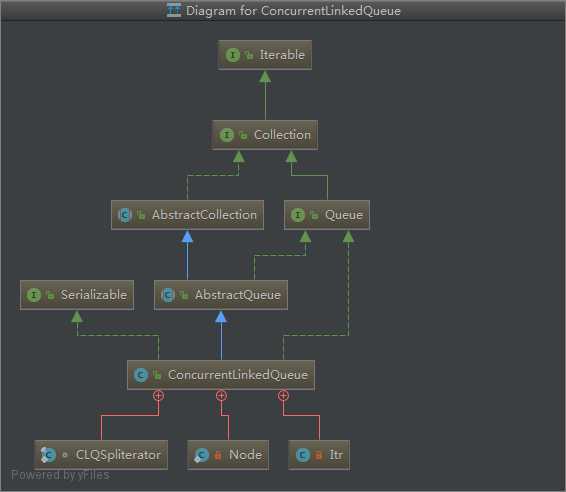标签:多线程操作 数据保存 always img 大于 方法 rac queue contain
ConcurrentLinkedQueue是非阻塞无界的,基于FIFO原则,线程安全的队列,新节点的插入都是在队列的尾部插入的(tail节点),该队列适合于多个线程共享同一个集合时使用。

/**无参数构造函数,默认创建一个节点为nul的队列,head、tail节点同时指向null节点**/
public ConcurrentLinkedQueue() {
head = tail = new Node<E>(null);
}
/**有参数构造函数,传递一个集合,通过遍历集合将集合中的数据保存在队列中(从尾节点插入)**/
public ConcurrentLinkedQueue(Collection<? extends E> c) {
Node<E> h = null, t = null;
for (E e : c) {
/**检查是否为空**/
checkNotNull(e);
Node<E> newNode = new Node<E>(e);
/**初始队列为空,直接将head、tail同时指向该节点**/
if (h == null)
h = t = newNode;
else {
/**添加到尾节点**/
t.lazySetNext(newNode);
t = newNode;
}
}
/**在参数为null或者size为0执行**/
if (h == null)
h = t = new Node<E>(null);
head = h;
tail = t;
}
/**插入操作执行在tail节点,队列是无界的,不会返回false值**/
public boolean offer(E e) {
/**检查是否为空**/
checkNotNull(e);
final Node<E> newNode = new Node<E>(e);
for (Node<E> t = tail, p = t;;) {
Node<E> q = p.next;
if (q == null) {
// q为空表明,tail的next节点为null(即tail节点就是尾节点)
if (p.casNext(null, newNode)) {
/**执行cas的交换操作,将p(tail)节点的next节点设置成newNode节点,此处是CAS操作,
*即使存在多线程操作一次只会有一个几点插入到队列尾部
**/
if (p != t) // 一次跳跃两个节点设置tail节点
casTail(t, newNode); // Failure is OK.
return true;
}
// Lost CAS race to another thread; re-read next
}
else if (p == q)
// We have fallen off list. If tail is unchanged, it
// will also be off-list, in which case we need to
// jump to head, from which all live nodes are always
// reachable. Else the new tail is a better bet.
p = (t != (t = tail)) ? t : head;
else
/**当多个线程同时执行offer操作时,cas失败的线程会执行该操作,设置q节点为tail节点,执行下一次循环**/
p = (p != t && t != (t = tail)) ? t : q;
}
}
add插入操作实际上调用的就是offer操作
public boolean add(E e) {
return offer(e);
}
poll出队列:
public E poll() {
restartFromHead:
for (;;) {
//从head节点开始遍历
for (Node<E> h = head, p = h, q;;) {
E item = p.item;
//head节点不为null并且cas操作将head节点设置为null成功
if (item != null && p.casItem(item, null)) {
// Successful CAS is the linearization point
// for item to be removed from this queue.
if (p != h) // hop two nodes at a time
//更新head节点
updateHead(h, ((q = p.next) != null) ? q : p);
return item;
}
else if ((q = p.next) == null) {
//多线程获取节点失败,同时队列中只有一个节点(或者本身队列为空)
updateHead(h, p);
return null;
}
else if (p == q)
continue restartFromHead;
else
//获取next节点
p = q;
}
}
}
/**peek操作是获取队列的head节点,只获取不移除**/
public E peek() {
restartFromHead:
for (;;) {
for (Node<E> h = head, p = h, q;;) {
E item = p.item;
if (item != null || (q = p.next) == null) {
updateHead(h, p);
return item;
}
else if (p == q)
continue restartFromHead;
else
p = q;
}
}
}
/**size操作返回队列中节点的数量(数量大于Integer.MAX_VALUE时,返回Integer.MAX_VALUE,但是数据不准确,
*该队列是线程安全的队列,在获取size操作时可能存在其他的add/remove操作在进行
**/
public int size() {
int count = 0;
for (Node<E> p = first(); p != null; p = succ(p))
if (p.item != null)
// Collection.size() spec says to max out
if (++count == Integer.MAX_VALUE)
break;
return count;
}
/**获取第一个没有被删除,可用的节点(可以看做是poll/peek操作的变体)**/
Node<E> first() {
restartFromHead:
for (;;) {
for (Node<E> h = head, p = h, q;;) {
boolean hasItem = (p.item != null);
if (hasItem || (q = p.next) == null) {
updateHead(h, p);
return hasItem ? p : null;
}
else if (p == q)
continue restartFromHead;
else
p = q;
}
}
}
remove操作:
/**如果队列中存在多个相同的值,每次只会删除第一个**/
public boolean remove(Object o) {
if (o != null) {
Node<E> next, pred = null;
//从队列中第一个可用节点(有效节点)开始遍历
for (Node<E> p = first(); p != null; pred = p, p = next) {
boolean removed = false;
E item = p.item;
if (item != null) {
if (!o.equals(item)) {
next = succ(p);
continue;
}
//将remove的节点值置为null
removed = p.casItem(item, null);
}
next = succ(p);
//如果remove节点有前驱节点,将前驱节点的next指向remove节点的后继节点
if (pred != null && next != null) // unlink
pred.casNext(p, next);
if (removed)
return true;
}
}
return false;
}
containts操作:
/**contains操作与remove操作极其相似,只是不会进行remove,该方法判断结果并不准确,可能存在删除操作**/
public boolean contains(Object o) {
if (o == null) return false;
for (Node<E> p = first(); p != null; p = succ(p)) {
E item = p.item;
if (item != null && o.equals(item))
return true;
}
return false;
}
标签:多线程操作 数据保存 always img 大于 方法 rac queue contain
原文地址:https://www.cnblogs.com/lenmom/p/12018344.html